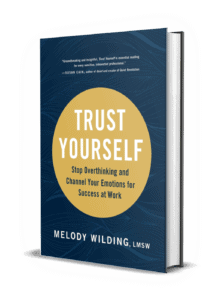Do you want and deserve more from your job, but get hung up when it comes to asking for what you’re worth?
Are you afraid to ask for a raised salary or command better rates in your business?
Does the discomfort of negotiating make you avoid it at all costs?
If you answered yes, then you’re not alone. Studies show that women feel almost triple the amount of apprehension and anxiety about negotiating than men.
In my work with leaders and entrepreneurs, I see one particular challenge holding women back time and time again: we’re afraid of negotiating for what we want out of fear of conflict and rejection.
The result? We sacrifice promotions, raises, opportunities for growth, and so much peace of mind.
For many of us, speaking up and asking for what we want sets off a crisis of self-consciousness and doubt.
And it’s no wonder: Women are in a double-bind.
- We’re expected to be leaders, yet be team players
- We’re told to follow our goals, but to be considerate and take into account how our actions affect others
- If we speak up or negotiate, we’re afraid of being disliked or gossiped about
Because we’re emotionally intelligent and understand the consequences of asking, we tone down our requests – or worse, don’t ask at all.
This loss of confidence starts when we’re young and those limiting beliefs can be reflected at work and at home. We stop taking chances. We choose not to try. We internalize criticism and take feedback way too personally. No matter how many degrees we have or how many awards we’ve won, we still feel inadequate. We cope by settling for situations that make us resentful and unhappy.
Asking for what you’re worth first and foremost involves getting to the root of your discomfort around money. If you want to overcome self-doubt and earn what you deserve, then you have to change the invisible scripts holding you back from being fully confident.
Changing Your Relationship with Money
Many of us can recall a negotiation or money scenario that made us feel inferior or incapable. The problem is that we then attach a meaning to those experiences about what we deserve, never challenging those deep-seated feelings of inadequacy.
This exercise will help you understand the roots of your relationship with money and your discomfort with confrontation and negotiation. The better you can understand your early programming, the more power you have to change and take action against what you’re afraid of.
- What’s the first emotion you feel when you think about money?
- How often do you offer discounts on your products or services?
- Why do you find it difficult to charge what you’re worth?
- What’s the first reaction you have when someone tells you “no”?
- What is your most joyful memory around money?
- What is your most painful money memory?
- What did your family teach you about negotiating?
- Was advocating on your own behalf off-limits, welcome, repressed?
- What negotiating approach did your family use the most? Were they aggressive, cooperative, indirect, passive, constructive? Did they avoid negotiation?
- Do early memories bring up negative or positive emotions about money?
- When you were a child was it acceptable for girls or women to speak up?
- How did you get what you wanted a child?
- What other major experiences or factors have shaped your outlook towards valuing yourself and asking for what you’re worth?
- What is your purpose for money?
It’s entirely possible to shift your attitude around money and negotiating. You can rebuild your confidence and hone the skills you need to make bold asks. Just start from the inside first.









